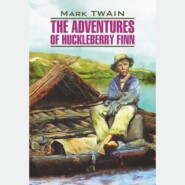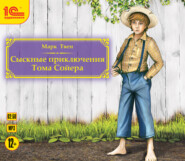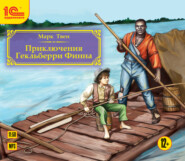По всем вопросам обращайтесь на: info@litportal.ru
(©) 2003-2025.
✖
A Double Barrelled Detective Story
Автор
Год написания книги
2015
Настройки чтения
Размер шрифта
Высота строк
Поля
“‘Catholic, your Honor.’
“’Very good. Snip me a bit from the bed blanket, please. Ah, thanks. Part wool – foreign make. Very well. A snip from some garment of the child’s, please. Thanks. Cotton. Shows wear. An excellent clue, excellent. Pass me a pallet of the floor dirt, if you’ll be so kind. Thanks, many thanks. Ah, admirable, admirable! Now we know where we are, I think.’ You see, boys, he’s got all the clues he wants now; he don’t need anything more. Now, then, what does this Extraordinary Man do? He lays those snips and that dirt out on the table and leans over them on his elbows, and puts them together side by side and studies them – mumbles to himself, ‘Female’; changes them around – mumbles, ‘Six years old’; changes them this way and that – again mumbles: ’Five teeth – one a-coming – Catholic – yarn – cotton – kip – damn that kip.’ Then he straightens up and gazes toward heaven, and plows his hands through his hair – plows and plows, muttering, ‘Damn that kip!’ Then he stands up and frowns, and begins to tally off his clues on his fingers – and gets stuck at the ring-finger. But only just a minute – then his face glares all up in a smile like a house afire, and he straightens up stately and majestic, and says to the crowd, ’Take a lantern, a couple of you, and go down to Injun Billy’s and fetch the child – the rest of you go ’long home to bed; good-night, madam; good-night, gents.’ And he bows like the Matterhorn, and pulls out for the tavern. That’s his style, and the Only – scientific, intellectual – all over in fifteen minutes – no poking around all over the sage-brush range an hour and a half in a mass-meeting crowd for him, boys – you hear me!”
“By Jackson, it’s grand!” said Ham Sandwich. “Wells-Fargo, you’ve got him down to a dot. He ain’t painted up any exacter to the life in the books. By George, I can just see him – can’t you, boys?”
“You bet you! It’s just a photograft, that’s what it is.”
Ferguson was profoundly pleased with his success, and grateful. He sat silently enjoying his happiness a little while, then he murmured, with a deep awe in his voice,
“I wonder if God made him?”
There was no response for a moment; then Ham Sandwich said, reverently,
“Not all at one time, I reckon.”
II
At eight o’clock that evening two persons were groping their way past Flint Buckner’s cabin in the frosty gloom. They were Sherlock Holmes and his nephew.
“Stop here in the road a moment, uncle,” said Fetlock, “while I run to my cabin; I won’t be gone a minute.”
He asked for something – the uncle furnished it – then he disappeared in the darkness, but soon returned, and the talking-walk was resumed. By nine o’clock they had wandered back to the tavern. They worked their way through the billiard-room, where a crowd had gathered in the hope of getting a glimpse of the Extraordinary Man. A royal cheer was raised. Mr. Holmes acknowledged the compliment with a series of courtly bows, and as he was passing out his nephew said to the assemblage,
“Uncle Sherlock’s got some work to do, gentlemen, that ’ll keep him till twelve or one; but he’ll be down again then, or earlier if he can, and hopes some of you’ll be left to take a drink with him.”
“By George, he’s just a duke, boys! Three cheers for Sherlock Holmes, the greatest man that ever lived!” shouted Ferguson. “Hip, hip, hip—”
“Hurrah! hurrah! hurrah! Tiger!”
The uproar shook the building, so hearty was the feeling the boys put into their welcome. Upstairs the uncle reproached the nephew gently, saying,
“What did you get me into that engagement for?”
“I reckon you don’t want to be unpopular, do you, uncle? Well, then, don’t you put on any exclusiveness in a mining-camp, that’s all. The boys admire you; but if you was to leave without taking a drink with them, they’d set you down for a snob. And, besides, you said you had home talk enough in stock to keep us up and at it half the night.”
The boy was right, and wise – the uncle acknowledged it. The boy was wise in another detail which he did not mention – except to himself: “Uncle and the others will come handy – in the way of nailing an alibi where it can’t be budged.”
He and his uncle talked diligently about three hours. Then, about midnight, Fetlock stepped down-stairs and took a position in the dark a dozen steps from the tavern, and waited. Five minutes later Flint Buckner came rocking out of the billiard-room and almost brushed him as he passed.
“I’ve got him!” muttered the boy. He continued to himself, looking after the shadowy form: “Good-by – good-by for good, Flint Buckner; you called my mother a – well, never mind what; it’s all right, now; you’re taking your last walk, friend.”
He went musing back into the tavern. “From now till one is an hour. We’ll spend it with the boys; it’s good for the alibi.”
He brought Sherlock Holmes to the billiard-room, which was jammed with eager and admiring miners; the guest called the drinks, and the fun began. Everybody was happy; everybody was complimentary; the ice was soon broken; songs, anecdotes, and more drinks followed, and the pregnant minutes flew. At six minutes to one, when the jollity was at its highest—
Boom!
There was silence instantly. The deep sound came rolling and rumbling from peak to peak up the gorge, then died down, and ceased. The spell broke, then, and the men made a rush for the door, saying,
“Something’s blown up!”
Outside, a voice in the darkness said, “It’s away down the gorge; I saw the flash.”
The crowd poured down the canyon – Holmes, Fetlock, Archy Stillman, everybody. They made the mile in a few minutes. By the light of a lantern they found the smooth and solid dirt floor of Flint Buckner’s cabin; of the cabin itself not a vestige remained, not a rag nor a splinter. Nor any sign of Flint. Search-parties sought here and there and yonder, and presently a cry went up.
“Here he is!”
It was true. Fifty yards down the gulch they had found him – that is, they had found a crushed and lifeless mass which represented him. Fetlock Jones hurried thither with the others and looked.
The inquest was a fifteen-minute affair. Ham Sandwich, foreman of the jury, handed up the verdict, which was phrased with a certain unstudied literary grace, and closed with this finding, to wit: that “deceased came to his death by his own act or some other person or persons unknown to this jury not leaving any family or similar effects behind but his cabin which was blown away and God have mercy on his soul amen.”
Then the impatient jury rejoined the main crowd, for the storm-centre of interest was there – Sherlock Holmes. The miners stood silent and reverent in a half-circle, inclosing a large vacant space which included the front exposure of the site of the late premises. In this considerable space the Extraordinary Man was moving about, attended by his nephew with a lantern. With a tape he took measurements of the cabin site; of the distance from the wall of chaparral to the road; of the height of the chaparral bushes; also various other measurements. He gathered a rag here, a splinter there, and a pinch of earth yonder, inspected them profoundly, and preserved them. He took the “lay” of the place with a pocket-compass, allowing two seconds for magnetic variation. He took the time (Pacific) by his watch, correcting it for local time. He paced off the distance from the cabin site to the corpse, and corrected that for tidal differentiation. He took the altitude with a pocket-aneroid, and the temperature with a pocket-thermometer. Finally he said, with a stately bow:
“It is finished. Shall we return, gentlemen?”
He took up the line of march for the tavern, and the crowd fell into his wake, earnestly discussing and admiring the Extraordinary Man, and interlarding guesses as to the origin of the tragedy and who the author of it might he.
“My, but it’s grand luck having him here – hey, boys?” said Ferguson.
“It’s the biggest thing of the century,” said Ham Sandwich. “It ’ll go all over the world; you mark my words.”
“You bet!” said Jake Parker, the blacksmith. “It ’ll boom this camp. Ain’t it so, Wells-Fargo?”
“Well, as you want my opinion – if it’s any sign of how I think about it, I can tell you this: yesterday I was holding the Straight Flush claim at two dollars a foot; I’d like to see the man that can get it at sixteen today.”
“Right you are, Wells-Fargo! It’s the grandest luck a new camp ever struck. Say, did you see him collar them little rags and dirt and things? What an eye! He just can’t overlook a clue—’tain’t in him.”
“That’s so. And they wouldn’t mean a thing to anybody else; but to him, why, they’re just a book – large print at that.”
“Sure’s you’re born! Them odds and ends have got their little old secret, and they think there ain’t anybody can pull it; but, land! when he sets his grip there they’ve got to squeal, and don’t you forget it.”
“Boys, I ain’t sorry, now, that he wasn’t here to roust out the child; this is a bigger thing, by a long sight. Yes, sir, and more tangled up and scientific and intellectual.”
“I reckon we’re all of us glad it’s turned out this way. Glad? ’George! it ain’t any name for it. Dontchuknow, Archy could ’ve learnt something if he’d had the nous to stand by and take notice of how that man works the system. But no; he went poking up into the chaparral and just missed the whole thing.”
“It’s true as gospel; I seen it myself. Well, Archy’s young. He’ll know better one of these days.”
“Say, boys, who do you reckon done it?”
That was a difficult question, and brought out a world of unsatisfying conjecture. Various men were mentioned as possibilities, but one by one they were discarded as not being eligible. No one but young Hillyer had been intimate with Flint Buckner; no one had really had a quarrel with him; he had affronted every man who had tried to make up to him, although not quite offensively enough to require bloodshed. There was one name that was upon every tongue from the start, but it was the last to get utterance – Fetlock Jones’s. It was Pat Riley that mentioned it.
“Oh, well,” the boys said, “of course we’ve all thought of him, because he had a million rights to kill Flint Buckner, and it was just his plain duty to do it. But all the same there’s two things we can’t get around, for one thing, he hasn’t got the sand; and for another, he wasn’t anywhere near the place when it happened.”
“I know it,” said Pat. “He was there in the billiard-room with us when it happened.”
“Yes, and was there all the time for an hour before it happened.”
“It’s so. And lucky for him, too. He’d have been suspected in a minute if it hadn’t been for that.”

















